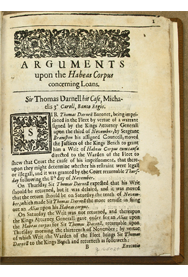Charles I and the Courts
Charles I (1625-1649) was another divisive king whose continued taxation without consent - to raise funds for war - and imprisonment without judicial process, helped lead to political rebellion and the English Civil War. In Darnell's case (1627), five knights who had been imprisoned for refusing to pay forced loans, without formal charge, brought writs of habeas corpus to be freed. The legality of the loans was not decided, but Darnell's case galvanized MPs against Charles and helped lead to the Petition of Right.
Charles expanded the reach of Star Chamber, a court that operated outside of common law, and used it in part to punish public criticism and tax evasion. William Prynne, who argued in The Soveraigne Power of Parliaments (1643) for parliamentary supremacy over the king, had his ears cropped and cheeks branded after a conviction in the court. Even more measured voices like William Lambarde, in his Archeion (1635), acknowledged that Star Chamber was unique. Among key documents demanding reform prior to Charles's trial and execution, the Levellers' An Agreement of the People (1647) argued for freedom of conscience, and that all individuals should be equally subject to the laws.
![Title page of [Book title start] The Arguments Upon the Writ of Habeas Corpus ... [Book title end].](../riesenfeld_images/magnacarta/images/xxxdarnell1649thumb.png)

![Title page of [Book title start] The Case of Shipmony Briefly Discoursed ... [Book title end].](../riesenfeld_images/magnacarta/images/xxxparker1640thumb.png)
![Title page of [Book title start] Star-Chamber Cases ... [Book title end].](../riesenfeld_images/magnacarta/images/xxxcrompton1630thumb.png)
![Title page of Lambarde's [Book title start] Archeion ... [Book title end].](../riesenfeld_images/magnacarta/images/xxxlambarde1635thumb.png)
![Title page from [Book title start] An Agreement of the People for a Firme and Present Peace ... [Book title end].](../riesenfeld_images/magnacarta/images/xAgreementlevellers1647thumb.png)
![Pages from [Book title start] An Agreement of the People for a Firme and Present Peace ... [Book title end].](../riesenfeld_images/magnacarta/images/xxxCharlesAgreeFirmPeacethumb.png)
